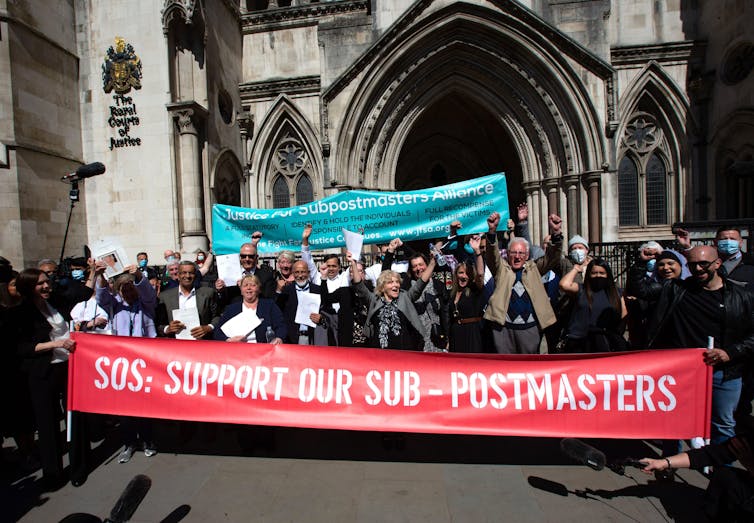The UK prime minister, Rishi Sunak, has announced that is government will introduce blanket legislation to clear sub-postmasters convicted of wrongdoing as a result of the Post Office Horizon scandal .
Between 1999 and 2015 – and potentially much earlier – more than 700 sub-postmasters were convicted of fraud, theft or false accounting.
Legal experts have long highlighted the Post Office’s litigious attitude and its cases relying, often exclusively, on evidence from the faulty IT system itself. Many victims pleaded guilty simply on advice that this was their best chance of avoiding prison.
That the Post Office was able to bring so many prosecutions – and to conduct them so appallingly – is because the company was not supervised. As a private company, and not a statutory body, it isn’t subject to government oversight. Just as any other public company or private citizen might, the Post Office brought private prosecutions.

As co-directors of the Criminal Law Reform Now Network, we have been working on a review of private prosecutions since 2019. Some do in fact serve the public interest, especially in areas where the police and Crown Prosecution Service (CPS) have effectively retreated under budget cuts. But when large companies and organisations such as the Post Office prosecute, they are not subject to accreditation and inspection or any other oversight.
How private prosecutions are brought
To bring a private prosecution, a person or company asks a magistrate to issue a summons against the accused person. If the applicant can show there is evidence, the magistrate generally will do so.
The magistrate does not assess that evidence, however, nor the likelihood of conviction. They do not decide whether there is any public interest in bringing the case. They do not ask why the police and CPS have not been involved. And they do not usually invite representations from the accused person.
When the accused person answers the summons, an ordinary criminal case ensues – not a civil case. The magistrate decides whether the charges are serious enough to be tried in the Crown Court. If convicted, the defendant risks prison.
Whoever brings the prosecution has the same statutory duties imposed on anyone who prosecutes, including disclosing evidence in their possession which might assist the case for the accused. This is one duty which the Post Office manifestly declined to perform, as has been highlighted by statutory inquiry into the Post Office Horizon scandal.

Safeguards for private prosecutions
There has long been the possibility for the director of public prosecutions (DPP) – who, since 1986, is the head of the CPS – to take over a private prosecution or discontinue it. Since 2009, the policy has been to discontinue private prosecutions which do not meet the same core standards (that there be a realistic prospect of prosecution or that a prosecution is in the public interest) with which the CPS must comply.
However, it would normally be up to the accused person themselves to ask that the DDP or CPS should take it over, and the decision would still be made on the basis of the files in the possession of the private prosecutor.
We know of no case where any sub-postmaster actually asked the DPP to intervene. And even if they had, there is no particular reason to suppose that they would have intervened. Any case presented by the Post Office (which would likely have said nothing of its problems with the Horizon software) would have looked perfectly reasonable.
Crucially, because only one sub-postmaster would have approached the DPP at any given time, the CPS would have had no way of knowing the industrial scale on which sub-postmasters were being prosecuted across the country, almost all on the basis of contested evidence arising from the Horizon software (which, one hopes, would then have raised alarm bells).
As with the magistrates’ summons, the safeguard may be relatively effective in the case of an amateur prosecutor who doesn’t know what they are doing. But it is likely ineffective when, unknown to others, a large and reputable company is not acting properly but its case is well represented.
Private prosecutions should be reformed, not abolished
It is important not to look at private prosecutions entirely through the prism of the Post Office scandal. There are many crimes, including complex frauds and those involving infringement of copyright, where the police lack the resources or expertise to investigate effectively. Much the same can be said of the CPS.
Where wealthy and determined victims have the means to investigate and prosecute effectively, they may, in fact, be doing a public service. Some succesful private prosecutions have led to confiscation orders being made against convicted defendants that have resulted in millions of pounds being handed over to the Treasury.
In recent years, many legal firms specialising in private prosecutions have formed their own Private Prosecutors’ Association. This has a voluntary code of conduct.
The justice select committee has recommended that anybody who is the subject of a private prosecution should at least be told this in clear terms and informed of their right to ask the DPP to consider taking over the prosecution. A broader problem is that the CPS is not at all equipped to review anywhere near the bulk of cases which could be referred to it.
The committee has also proposed that the government should consider a system for inspections. After all, both the CPS and the Serious Fraud Office are subject to statutory inspection.
This relates to a fundamental aspect of the scandal: no one had any power to compulsorily inspect the Post Office’s practices. For too long, those who were rightly suspicious of the Post Office – including several MPs – could not call upon anyone with power in the criminal justice system to take action. This vacuum should surely now be addressed.

